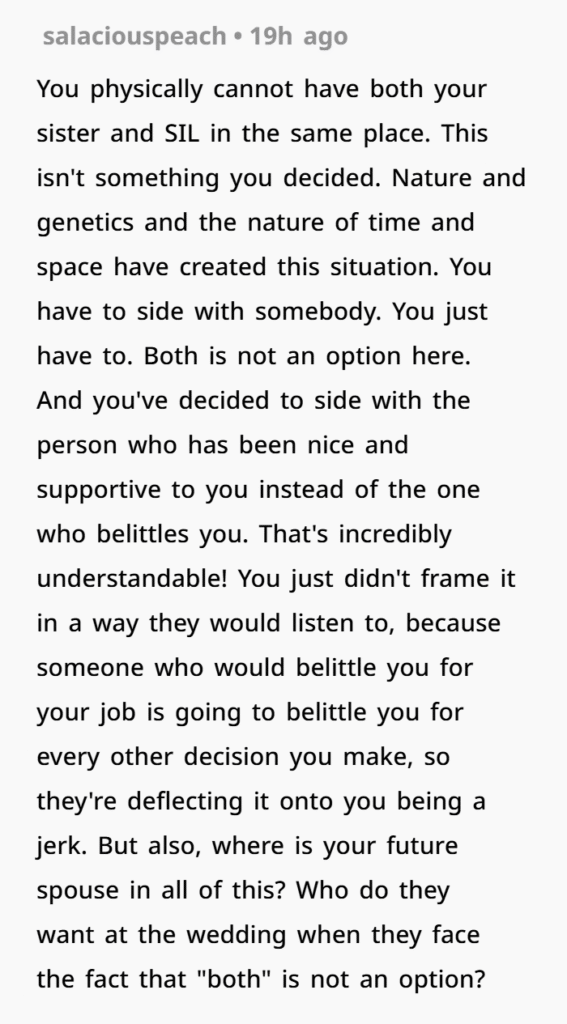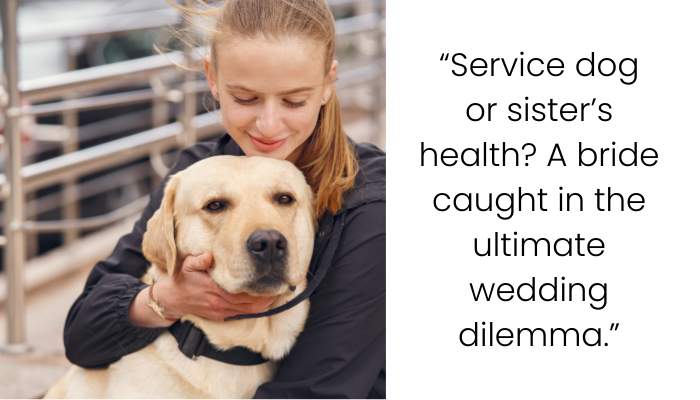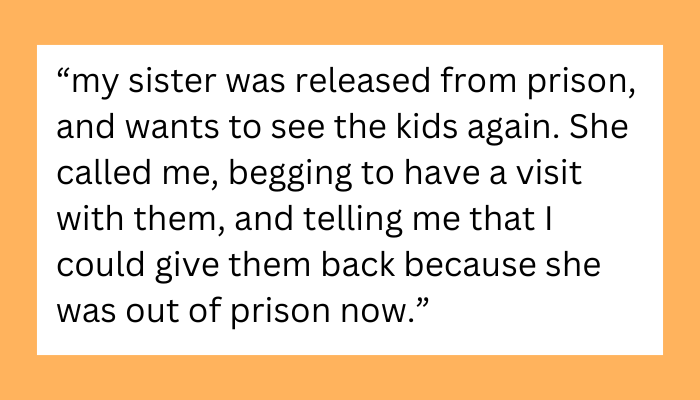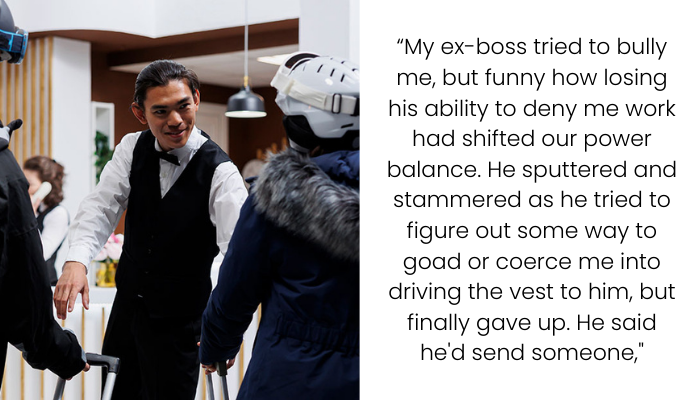Bride Bans SIL’s Service Dog, Family Drama Erupts
OP (the bride-to-be) is planning her wedding in five months and is facing a major emotional and logistical dilemma. Her sister, who she describes as her best friend and Maid of Honor, has a severe allergy to dogs — we’re talking asthma attacks, red swollen eyes, nonstop sneezing, and no relief from antihistamines. On the other side? Her sister-in-law (SIL), who has a medical service dog trained to detect seizures caused by a brain tumor she survived years ago.
SIL’s dog is a legitimate seizure alert service animal, crucial to her safety since she has several seizures a week and needs time to lay down and alert others. The issue? OP and her fiancé are holding their wedding in a small, indoor 50-person venue in winter, with no outdoor or larger-space option. They tried to compromise: proposing SIL bring an extra support person and have her husband on standby, while leaving the dog at home for just one day. But SIL exploded, calling OP ableist and threatening drama. Now, OP’s MIL is threatening not to come at all, and the whole family is taking sides.
So, is it ableist to ask someone to leave their service dog at home for one day — or is it fair to prioritize your own sister’s life-threatening allergies on your wedding day?
The woman is refusing to let her sister-in-law bring her service dog to the wedding because her own sister is allergic
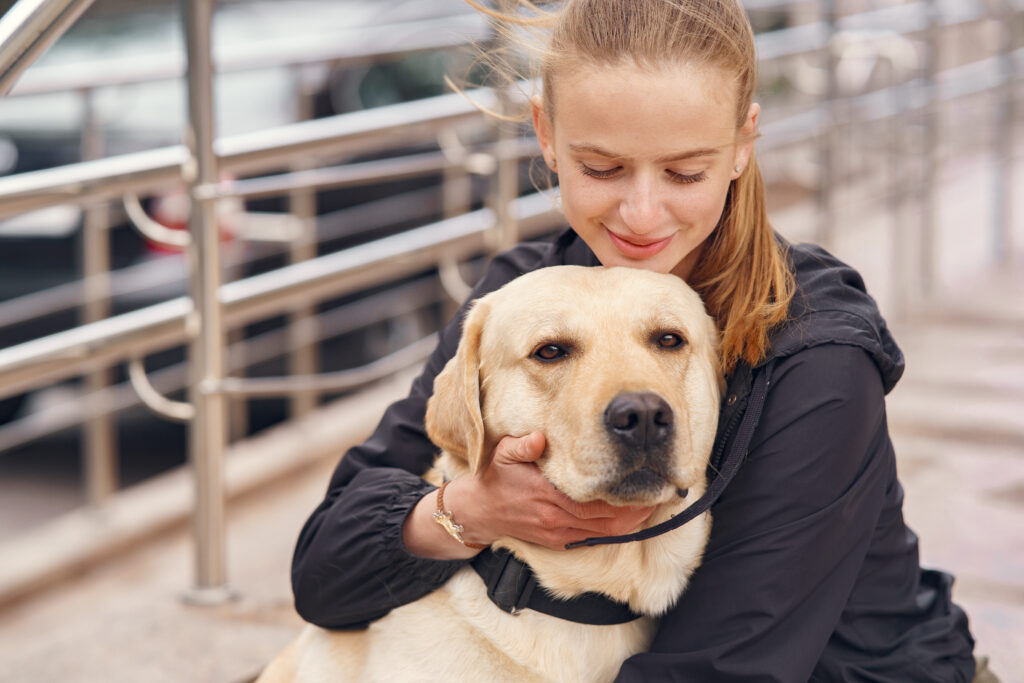
But the request isn’t going over well with the family















This one is a wild ride, and honestly? It’s one of those classic “no perfect answer” scenarios. But let’s break it down and explore both the emotional and legal sides — and how OP might navigate this.
🐕 What Is a Service Dog, Legally Speaking?
Under the Americans with Disabilities Act (ADA), a service animal is defined as a dog that has been individually trained to perform tasks for a person with a disability. This includes seizure alert dogs, who can sense an oncoming seizure and give their handler precious moments to seek help or get to safety.
They’re not pets. They’re medical equipment, similar to a wheelchair, insulin pump, or inhaler.

So when OP asked SIL to leave her dog at home — even with extra human support — SIL probably felt like she was being asked to go without her own life-saving tool. And to be fair, from a disability rights perspective, that can definitely feel discriminatory. Especially if the dog is medically necessary, not just for “comfort” or emotional support.
😷 But Allergies Are a Disability Too
And here’s the kicker: severe allergies like the ones OP’s sister has are also recognized as disabilities under both the ADA and Section 504 of the Rehabilitation Act. A person with a medically documented, life-threatening allergy has just as much right to be safe and accommodated in public spaces.
High CPC Keywords: dog allergies asthma wedding, service dog vs allergy conflict, ADA allergy service dog legal rights, disability rights conflicting needs wedding
So what happens when two people’s rights come into direct conflict?
The Department of Justice (DOJ) says that in cases where a service animal causes a direct threat to the health or safety of others (like triggering a serious allergic reaction), it can legally be excluded — but the handler should be offered reasonable accommodations. In other words, OP was within her legal rights to prioritize her sister’s safety, especially since she offered SIL alternative support.
👥 Emotional vs. Medical: The Core of the Conflict
What makes this tricky isn’t just the logistics — it’s the personal baggage. OP clearly doesn’t like her SIL and admits she has a bias. The SIL has been rude in the past, argumentative, and not exactly a joy to be around. So even though OP handled the situation calmly and offered compromises, her tone might’ve come across as cold or judgmental — especially over text.
People can smell tension a mile away, and if the messenger already doesn’t like you, it’s easy to assume the worst.
That said, it’s not unreasonable to:
- Want your Maid of Honor (who happens to be your sister and your favorite person) to be comfortable and safe
- Choose not to risk a medical emergency at your wedding
- Ask someone to make an exception for one day, especially when alternative safety measures were offered
The optics, though? Tricky. It looks like “choosing comfort over inclusion,” especially to those outside the allergy conversation.
💒 Venue Matters: Why No Compromise Feels Good Enough
Some commenters might say: “Just separate them!” or “Put them in different rooms!” But OP explains the venue is small, indoors, and the wedding is in winter. No option for outdoor separation. No budget for a bigger place. Plus, two wheelchair users (grandma and an aunt) limited the venue options even more.

So no, this isn’t a case of “just find a solution” — the venue was already a compromise.
💡 What Could Be Done (If Anything)?
Here are a few things OP could consider if she wants to salvage the relationship (but she’s not obligated to):
- Hire a medical professional or EMT to be on standby in place of the dog — showing you do care about SIL’s health
- Offer to livestream the ceremony for SIL and BIL if they can’t attend
- Write a heartfelt message to BIL explaining your position — he might be caught in the middle
- Talk to MIL directly, calmly, and outline your sister’s condition. Allergies aren’t “preferences” — they can be fatal.
Ultimately, OP did try to accommodate everyone — just not in the way SIL wanted.
🥴 Is OP the A**hole?
Let’s be brutally honest: This situation sucks. No one’s coming out of this with clean hands. But does that make OP the villain? Not really.
- She didn’t ban SIL from the wedding
- She didn’t call the dog a pet or dismiss the condition
- She tried to offer support, alternatives, and time to think
- She prioritized her sister’s medical needs — not aesthetics, not ego
Could the message have been delivered better? Sure. A face-to-face talk would’ve avoided the shock factor. Could she have added more empathy? Absolutely. But at the end of the day, asking someone to compromise for one day isn’t the same as being ableist.
This isn’t about being anti-disabled. It’s about two people with conflicting disabilities and no perfect way to accommodate both. And in those rare cases, someone has to make a call.
The author later shared more details in the comments, and readers acknowledged how tricky the situation was

